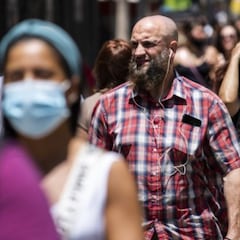Do all viruses weaken over time?
Once again, it feels like the end of the pandemic could be on the horizon. What factors are at play to diminish the strength of viruses?


Viral evolution is complex. No two are the same, evidenced clearly by the multiple and varied variants of covid-19 that have sprung up in the last two years. That makes it difficult to pinpoint exactly how the covid-19 virus is 'weakening'.
Weaker, in this context, means less likely to cause infection or death. There are two main ways a virus can get weaker, one through a population becoming resistant or totally immune to a virus, or by the virus randomly mutating into a weaker form of itself.
Related stories:
- A Japanese expert determines the most effective way to avoid Omicron infection
- What are the side effects of the third dose of Moderna and Pfizer vaccines?
- Where can I find high-quality masks?
A population becomes immune
A crucial way to 'weaken' a virus is immunization. Usually, this is done in one of two ways of vaccination or by virtue of having previously contracted the virus. For viruses that are extremely lethal, waiting to get infected is not an option. Vaccination provides human bodies the opportunity to combat a disease before it becomes strong enough to kill them, weakening it.
The most famous example of a disease that was neutralized through inoculation was smallpox. After a serious campaign by the World Health Organization in the second half of the 20th century, the disease was wiped from the planet. This was massively important, as the death rate after contracting the disease was 30 percent, with a higher rate for babies.
Covid used to be more than twenty times as lethal as the flu – thanks to vaccinations, it is now twice as dangerous as the flu. https://t.co/PMFE3fZbyB pic.twitter.com/75E87Ui9XL
— Mathieu von Rohr (@mathieuvonrohr) February 1, 2022
Clearly, vaccination had a big impact on 'weakening' the small pox virus. Vaccines have also had a great effect on 'weakening' the covid-19 virus by preventing deaths. Data from the Office for National Statistics in the United Kingdom found, from the period July to December 2021, the risk of death from covid-19 was 93.4 percent lower in the vaccinated compared to unvaccinated people.
For those vaccinated a virus is weaker. For those unvaccinated, it poses serious risk.
A virus becomes less lethal through mutation
Another way a virus can get weaker is through its own mutations. The longer a virus is in circulation, the higher the chance of it mutating. This could change a variety of factors, such as rate of transmission, lethality, how easy it can be tracked by testing, and more. It could stronger or weaker. However, this is completely up to chance. Mutations are random, so there is as much chance of the virus becoming more lethal as it is to become resistant to vaccines.
“We see it go in both directions, becoming more virulent and less virulent. So it certainly shouldn’t be taken for granted that Sars-Cov-2 will simply become milder," says Chris Wymant, Senior Researcher at the Big Data Institute, University of Oxford.
This is similar to what has happened with the covid-19 pandemic. When the Omicron variant surfaced in October there was widespread worry that the variant would be extremely dangerous. This was due to its rapid spread in the first country it was identified, South Africa.
However, as tests were undergone on the variant, it was discovered that Omicron was not as lethal as the preceding Delta variant, despite its rate of transmission. Vaccines had little effect on its transmission as people could be reinfected, sending cases soaring into the hundreds of thousands.
Related stories
But due to its reduced lethality and the prevalence of vaccines, deaths have not risen to the level that could have been expected if it was April 2020. Of course, this effect is greater in countries with populations that have a very high level of vaccination. The US is still having more than 3,000 covid-19 deaths a day due to having only 64.4 percent of the population double jabbed, one of the lowest rates in North America or Western Europe.
Effective vaccines can slow the spread of covid, but only if people are prepared to trust & listen to the government. This study by @tombollyky shows how the lack of trust in the government on the part of millions of Americans has proven to be lethal. https://t.co/wqCIsNXm3S
— Richard N. Haass (@RichardHaass) February 2, 2022
As has been proven throughout the pandemic, the more vaccinated the better. Some countries in Europe have declared the end of the pandemic, while others are lifting restrictions as cases fall. The US is attempting to do the same, but with an intolerable daily death rate from a disease that can be protected against.

